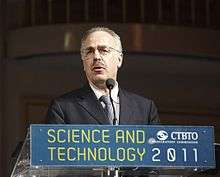Raymond Jeanloz
Raymond Jeanloz is a professor of earth and planetary science and of astronomy at the University of California, Berkeley. Educated at the California Institute of Technology, Amherst College and at Deep Springs College, he has contributed research fundamental to understanding of the composition of the Earth and the behavior of materials under high temperatures and pressures.[1] He is working with colleagues to investigate the conditions inside supergiant exoplanets.[2] Jeanloz is also a prominent figure in nuclear weapons policy, chairing the Committee on International Security and Arms Control at the National Academy of Sciences.[3] He was an Annenberg Distinguished Visiting Fellow at Stanford University's Hoover Institution from 2012 to 2013.[4]

Awards and honors
- 1984 James B. Macelwane Medal, American Geophysical Union[5]
- 1988 MacArthur Foundation "genius grant."[6]
- 1992 Fellow, American Academy of Arts and Sciences[7]
- 1992 Miller Research Professor, Miller Institute, University of California Berkeley
- 2004 Member, National Academy of Sciences, Geology Section.[8]
- 2008 Hans Bethe Award, Federation of American Scientists[3]
- 2009 Leo Szilard Lectureship Award of the American Physical Society for "contributions to development of sound public policy for nuclear weapons management and nuclear non-proliferation."[1]
- 2011-2016 Miller Senior Fellow, Miller Institute, University of California Berkeley
References
- "Prize Recipient". American Physical Society. Retrieved 6 February 2010.
- University of California Berkeley (2 May 2007). "UV laser, diamond can generate pressures close to those in cores of supergiant planets". Astrobiology.com (Press release). Archived from the original on 20 July 2012. Retrieved 28 February 2011.
- "FAS Honors Raymond Jeanloz with the 2008 Hans Bethe Award". Federation of American Scientists. 19 September 2008. Retrieved 6 February 2010.
- "Raymond Jeanloz: Annenberg Distinguished Visiting Fellow". Hoover Institution. Stanford University. Retrieved 7 December 2018.
- "James B. Macelwane Medal". American Geophysical Union. Retrieved 6 February 2010.
- "Fellows List". John D. and Catherine T. MacArthur Foundation. Archived from the original on 12 February 2010. Retrieved 6 February 2010.
- "List of Active Members by Class" (PDF). AAAS. 12 November 2009. Retrieved 6 February 2010.
- "Jeanloz, Raymond". National Academy of Sciences. Retrieved 6 February 2010.